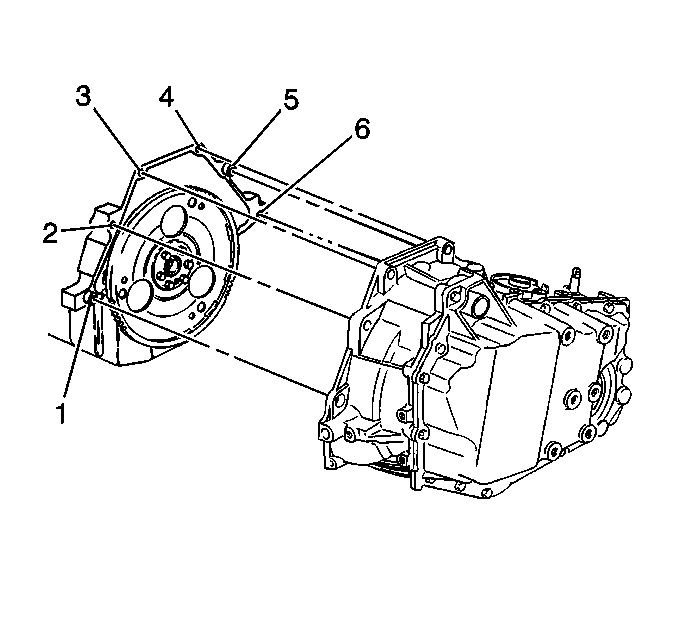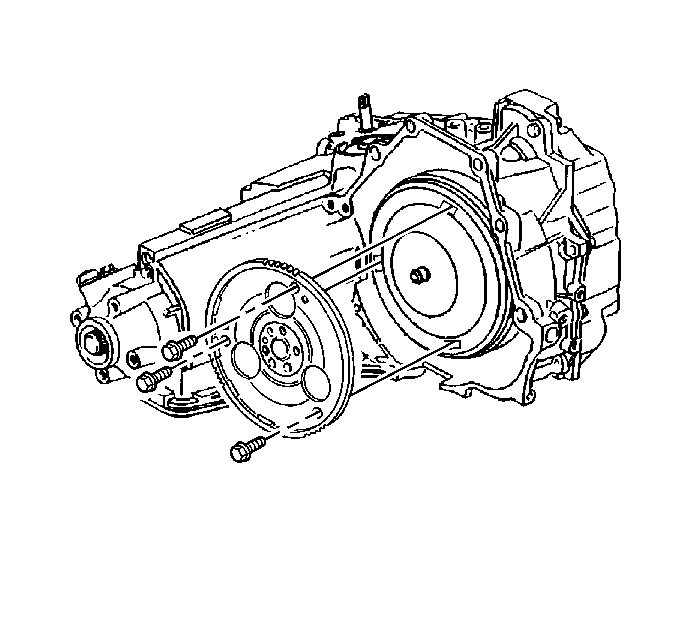For 1990-2009 cars only
Tools Required
| • | J 28467-A Engine Support Fixture |
| • | J 28467-90 Engine Support Adapter |
| • | J 36462 Engine Support Adapter Leg Set |
Removal Procedure
- Disconnect the battery ground (negative) cable. Refer to Battery Negative Cable Disconnection and Connection in Engine Electrical.
- Remove the throttle body air inlet duct. Refer to Engine Controls.
- Install the J 28467-90 .
- Install the J 28467-A .
- Install the J 36462 .
- Remove the engine mount struts. Refer to Engine Mount Strut Replacement in Engine Mechanical.
- Disconnect the wiring harness connectors from the transaxle and remove the wiring harness grounds.
- Remove the automatic transaxle range selector cable from the PNP switch. Refer to Range Selector Lever Cable Replacement .
- Remove the automatic transaxle range selector cable bracket with cable from transaxle. Refer to Range Selector Lever Cable Bracket Replacement .
- Remove the PNP switch. Refer to Range Selector Lever Cable Replacement .
- Remove the fluid filler tube. Refer to Transmission Fluid Filler Tube Replacement .
- Remove the power steering gear to frame retaining bolts. Refer to Power Steering Gear and Pump.
- Remove the upper transaxle bolts (3, 4 and 5) and stud (2).
- Raise and support the vehicle. Refer to Lifting and Jacking the Vehicle in General Information.
- Remove the front tires and wheels. Refer to Tire and Wheel Removal and Installation in Tires and Wheels.
- Remove the engine splash shields. Refer to Engine Splash Shield Replacement in Body Front End.
- Remove both tie rod ends from the steering knuckles. Refer to Steering Knuckle with Strut Replacement in Front Suspension.
- Remove the power steering gear from the frame. Refer to Steering Gear Replacement in Power Steering Gear and Pump.
- Use wire to secure the power steering gear to the vehicle.
- Remove the power steering cooler line clamps from the frame. Refer to Power Steering Cooler Pipe/Hose Replacement in Power Steering Gear and Pump.
- Remove the engine mount lower nuts. Refer to Engine Mount Replacement in Engine Mechanical.
- Remove the lower ball joints from the lower control arms. Refer to Steering Knuckle with Strut Replacement in Front Suspension.
- Remove the torque converter cover. Refer to Torque Converter Cover Replacement .
- Remove the starter motor. Refer to Starter Motor Replacement in Engine Electrical.
- Remove the torque converter bolts.
- Drain the transaxle fluid.
- Remove the transaxle oil cooler hoses from the transaxle. Refer to Automatic Transmission Oil Cooler Hose Replacement .
- Disconnect the drive axles from the transaxle. Refer to Wheel Drive Shaft Replacement in Drive Axle.
- Secure the drive axles to the steering knuckle and struts.
- Disconnect the wheel speed sensors wiring harness connectors. Refer to Wheel Speed Sensor Replacement in Antilock brake system.
- Disconnect the vehicle speed sensor wiring harness connector. Refer to Vehicle Speed Sensor Replacement .
- Use the transaxle table to support the transaxle.
- Remove the transaxle brace. Refer to Transmission Brace Replacement .
- Remove the lower transaxle bolt (6) and stud (1).
- With assistance Remove the frame to body bolts and Lower the frame from the vehicle . Refer to Frame Removal in Frame and Underbody.
- Lower the transaxle. Refer to the Transmission/Transaxle/Transfer Case Unit Repair Manual.
- Refer to Transmission/Transaxle/Transfer Case Unit Repair Manual for the inspection procedure and for the overhaul procedure.
- Flush the transmission cooler and lines whenever the transaxle is removed for overhaul or whenever the torque converter pump or the case is replaced. Refer to Transmission Fluid Cooler Flushing and Flow Test .



Installation Procedure
- Raise the transaxle.
- Install the lower transaxle bolt (6) and stud (1).
- Install the transaxle brace. Refer to Transmission Brace Replacement .
- Install the frame to body bolts. Refer to Frame Removal in Frame and Underbody.
- Remove the transaxle table.
- Connect the vehicle speed sensor wiring harness connector. Refer to Vehicle Speed Sensor Replacement .
- Connect the wheel speed sensors wiring harness connectors. Refer to Wheel Speed Sensor Replacement Engine Controls.
- Connect the drive axles to the transaxle. Refer to Wheel Drive Shaft Replacement in Drive Axle.
- Install the transaxle oil cooler hoses to the transaxle. Refer to Automatic Transmission Oil Cooler Hose Replacement .
- Install the torque converter bolts.
- Install the starter motor. Refer to Starter Motor Replacement in Engine Electrical.
- Install the torque converter cover. Refer to Torque Converter Cover Replacement .
- Install the lower ball joints to the lower control arms. Refer to Steering Knuckle with Strut Replacement in Front Suspension.
- Install the engine mount lower nuts. Refer to Engine Mount Replacement in Engine Mechanical.
- Install the power steering cooler line clamps to the frame. Refer to Power Steering Cooler Pipe/Hose Replacement in Power Steering Gear and Pump.
- Install the power steering gear to the frame. Refer to Steering Gear Replacement in Power Steering Gear and Pump.
- Install both the tie rod ends to the steering knuckles. Refer to Steering Knuckle with Strut Replacement in Front Suspension.
- Install the engine splash shields. Refer to Engine Splash Shield Replacement in Body Front End.
- Install the front tires and wheels. Refer to Tire and Wheel Removal and Installation in Tires and Wheels.
- Install the fluid filler tube. Refer to Transmission Fluid Filler Tube Replacement .
- Lower the vehicle.
- Install the upper transaxle bolts (3, 4 and 5) and stud (2). and install the wiring harness grounds.
- Install the PNP switch. Refer to Park/Neutral Position Switch Replacement .
- Install the automatic transaxle range selector cable bracket with cable to transaxle. Refer to Range Selector Lever Cable Bracket Replacement .
- Install the automatic transaxle range selector cable to the PNP switch. Refer to Range Selector Lever Cable Replacement .
- Install the wiring harness connectors to the transaxle.
- Install the engine mount struts. Refer to Engine Mount Strut Replacement in Engine Mechanical.
- Remove the J 36462 .
- Remove the J 28467-A .
- Remove the J 28467-90 .
- Install the throttle body air inlet duct. Refer to Engine Controls.
- Connect the battery ground (negative) cable. Refer to Battery Negative Cable Disconnection and Connection in Engine Electrical.
- Use the J 35944-A or equivalent to flush the following components whenever the transaxle is removed for overhaul or whenever the torque converter pump or the case is replaced:
- Adjust the fluid level. Refer to Transmission Fluid Check .
- Inspect for proper completion of the repairs. Refer to Road Test .
- Inspect for fluid leaks. Refer to Fluid Leak Diagnosis .
- Reset the TAP values. Refer to Adapt Function .
Notice: Refer to Fastener Notice in the Preface section.

Tighten
Tighten the lower transaxle to engine and engine to transaxle bolts to 75 N·m (55 lb ft).

Tighten
Tighten the torque converter bolts to 63 N·m (46 lb ft).

Tighten
Tighten the upper transaxle bolts and stud to 75 N·m (55 lb ft).
| • | Flush the transaxle oil cooler(s). |
| • | Flush the hoses. |
| • | Flush the pipes. |
| • | Refer to Transmission Fluid Cooler Flushing . |
Notice: Do NOT overfill the transaxle. The overfilling of the transaxle causes foaming, loss of fluid, shift complaints, and possible damage to the transaxle.
Important: It is recommended that transmission adaptive pressure (TAP) information be reset.
Resetting the TAP values using a scan tool will erase all learned values in all cells. As a result, The ECM, PCM or TCM will need to relearn TAP values. Transmission performance may be affected as new TAP values are learned.